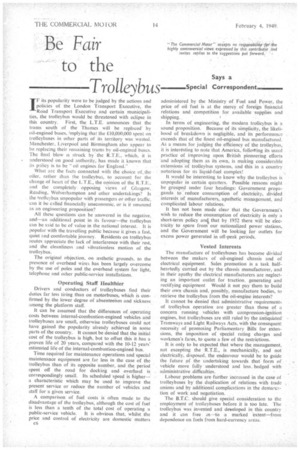Fair to the Trolleybus—SPecial
Page 14

If you've noticed an error in this article please click here to report it so we can fix it.
Says a Correspondent...
IF its popularity were to be judged by the actions and policies of the . London Transport Executive, the Road Transport Executive and certain municipalities, the trolleybus would be threatened with eclipse in this country. First, the L.T.E. announces that the trams south of the Thames will be replaced by oil-engined buses, implying that the .£10,000,000 spent on trolleybuses in other parts of its territory was wasted, Manchester, Liverpool and Birmingham also appear to be replacing their remaining trams by oil-engined buses. The final blow is struck by the R.T.E., Which, it is understood on good authority: has made it known that
its policy is to be "oil engines for England."
What are the facts connected with the choice of, the oiler, rather than the trolleybus, to account for the change of heart of the L.T.E., the opinion of the R.T.E., and the completely . opposing views of Glasgow, Reading, Wolverhampton and other undertakings? Is the trolleybus unpopular with passengers or other traffic, can it be called financially Uneconomic, or is it unsound as an engineering proposition?
All these questions can be answered in the negative, and—an additional point in its favour—the trolleybus can be said to be of value in the national interest. It is popular with the travelling public because it gives a fast, quiet and comfortable journey. Residents on trolleybus routes appreciate the lack of interference with their rest, and the cleanliness and vibrationless motion of the trolleybus.
The original objection, on esthetic grounds. to the presence of overhead wires has been largely overcome by the use of poles and the overhead system for light, telephone and other public-service installations.
Operating Staff Healthier Drivers and conductors of trolleybuses find their duties far less tiring than on motorbuses; which is con, firmed by the lower degree of absenteeism and sickness among the platform staff.
It can be assumed that the differences of. operating costs between internal-combustion-engined vehicles-and' trolleybuses are small, otherwise trolleybuses could not have gained the popularity already achieved in some parts of the country. It cannot be denied that the initial cost of the trolleybus is high, but to offset this it -has a proven life of 20 years, compared with the 10-12 years' estimated life of the internal-combustion-engined bus.
Time required for 'maintenance operations and special maintenance equipment are .far less in the case of the trolleybus than of its opposite number, and the period spent off the road for docking and overhaul is correspondingly small. Its scheduled .speed is higher— a characteristic which may be used to improve the present service or reduce the number of vehicles and staff for a given service,
A comparison of fuel costs is often made to the disadvantage of the trolleybus, although the cost of fuel is less than a tenth of the total cost of operating a public-service vehicle. It is obvious that, whilst the price and control of electricity are domestic matters c6
administered by the Ministry of Fuel and Power, the price of oil fuel is at the Mercy of foreign financial relations and competition for available supplies and
shipping.. .
In terms of engineering, the modern trolley bus is a sound proposition. Because of its simplicity, the likelihood of breakdown is negligible, and its performance exceeds that of the finest oil-engined bus manufactured. AS a means for judging the efficiency of the trolleybus, it is interesting to note that America, folloling its usual practice of improving upon British pioneering efforts and adopting them as its own, is making considerable extensions of trollcybus systems, and this in a country notorious for its liquid-fuel complex!
It would be interesting to know why the trolleybus is unpopular in certain quarters. Possible reasons might be grouped under four headings: Government propaganda to. reduce consumption of electricity, divided interests -of manufacturers,, apathetic management, and complicated labour relations.
It has not been made clear that the Government's wish to reduce the consumption of electricity is only a short-term policy anti that by 1952 there will be electricity to spare from our nationalized power stations, and the Government will be looking for outlets for excess power generated in off-peak periods.
Vested Interests
The manufacture of trolleybuses has become divided between the makers of oil-engined chassis and of electrical equipment. Sales promotion is a task halfheartedly carried out by the chassis manufacturer, and in their apathy the electrical manufacturers are neglecting an important outlet for traction, generating and rectifying equipment Would it not pay them to build their oWn chassis and, possibly, manufacture bodies, to retrieve the trolleybus from the oil-engine interests?
It cannot be denied that administrative requirements of trolleybus operation are greater than those of a concern running vehicles with compressionlignition engines, but trolleybuses are still ruled by the tintimilited Tramways and Light Railways Acts, with the consequent necessity of promoting Parliamentary Bills for extensions, the imposition of special rating charges and workmen's fares, to quote a few of the restrictions.
It is only to be expected that where the management, not excepting the R.T.E., is mechanically, and not electrically, disposed, the endeavour would be to guide the future of the undertaking towards that form of vehicle more !Idly understood and less. hedged with administrative difficulties.
Labour, problems are further increased in the case of trolleybuses by the duplication. of relations with trade , .unions and by additional complications in the demarcation of work, and negotiation.
The B.T.C. should give special consideration to the employment of trolleybuses before it is too late. The trolleybus was invented and developed in this country and it can free as—to a marked 'extent—from dependence on fuels from hard-currency areas.


























